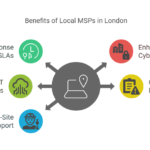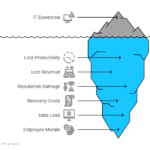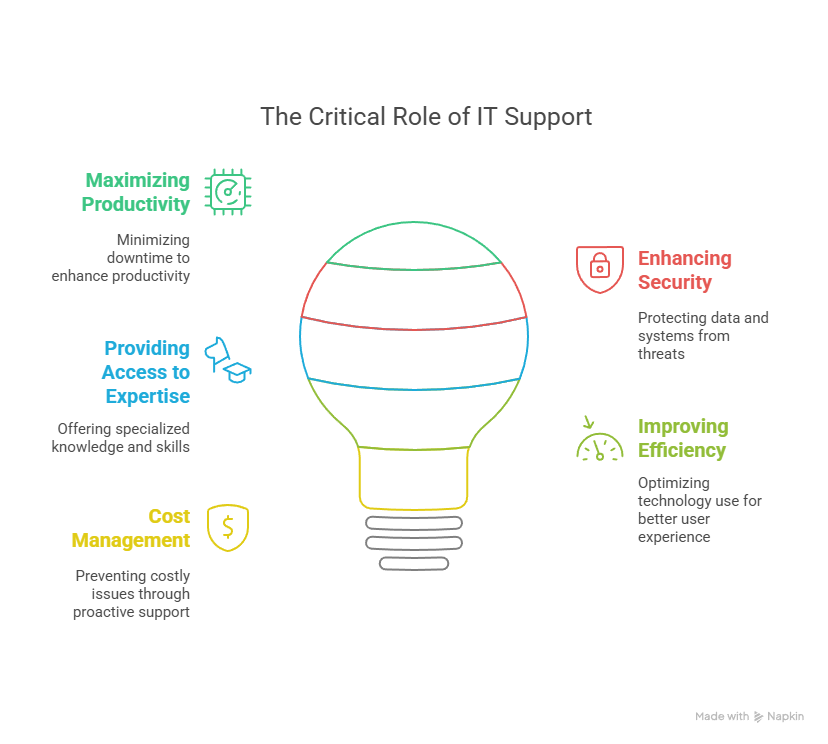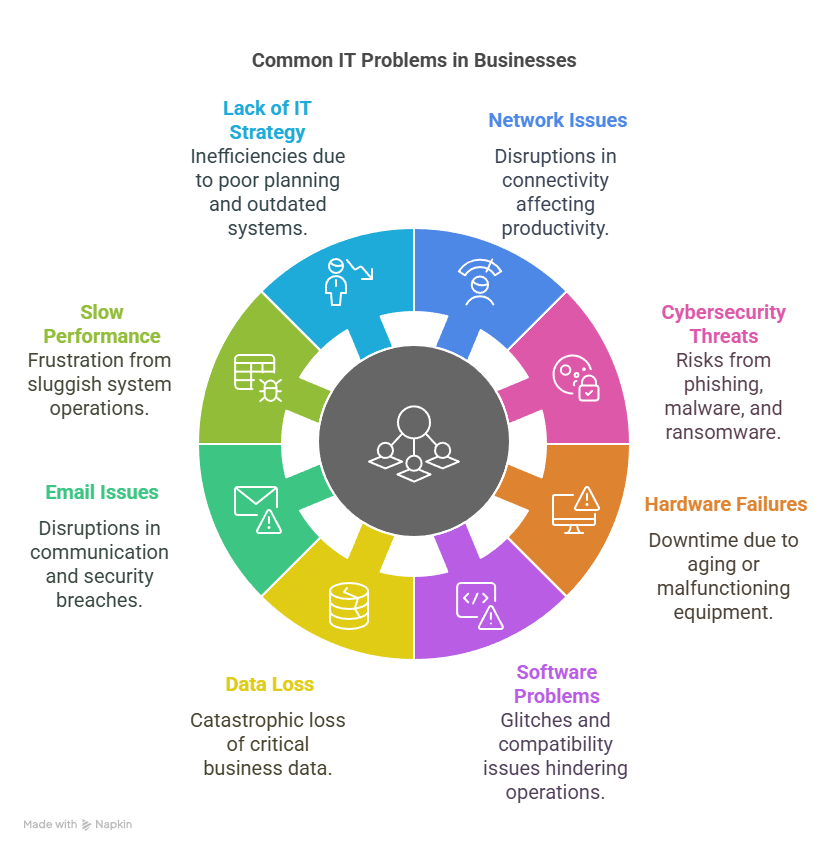Let’s be real – running a business is demanding. You’re juggling strategy, sales, marketing, operations… and often, unexpected tech headaches. Server crashes, cybersecurity worries, software glitches, employees struggling with slow computers – these IT issues don’t just cause frustration; they actively drain time, resources, and focus from your core mission. If you feel like your team is constantly firefighting tech problems instead of driving growth, exploring the benefits of outsourcing IT could be a game-changer for your business.
Many businesses, especially small to medium-sized ones (SMBs), start by handling IT in-house or relying on reactive “break-fix” support. But as technology becomes more complex and crucial, this approach often proves inefficient, costly, and risky.
Outsourcing IT to specialized providers offers a strategic alternative, delivering expertise, security, and peace of mind. This guide dives into the compelling advantages of letting dedicated professionals handle your technology needs.
First Off, What Does Outsourcing IT Mean?
Essentially, IT outsourcing involves contracting with an external third-party provider to manage some or all of your information technology functions. This can range from handling specific tasks like cybersecurity monitoring or cloud management to taking full responsibility for your entire IT infrastructure and user support via a Managed Services Provider (MSP).
Instead of employing a full internal IT department or calling a repair shop only when things break, you partner with specialists who proactively manage, maintain, secure, and support your technology environment, often for a predictable fee.
Why Consider Outsourcing? The Compelling Benefits of Outsourcing IT
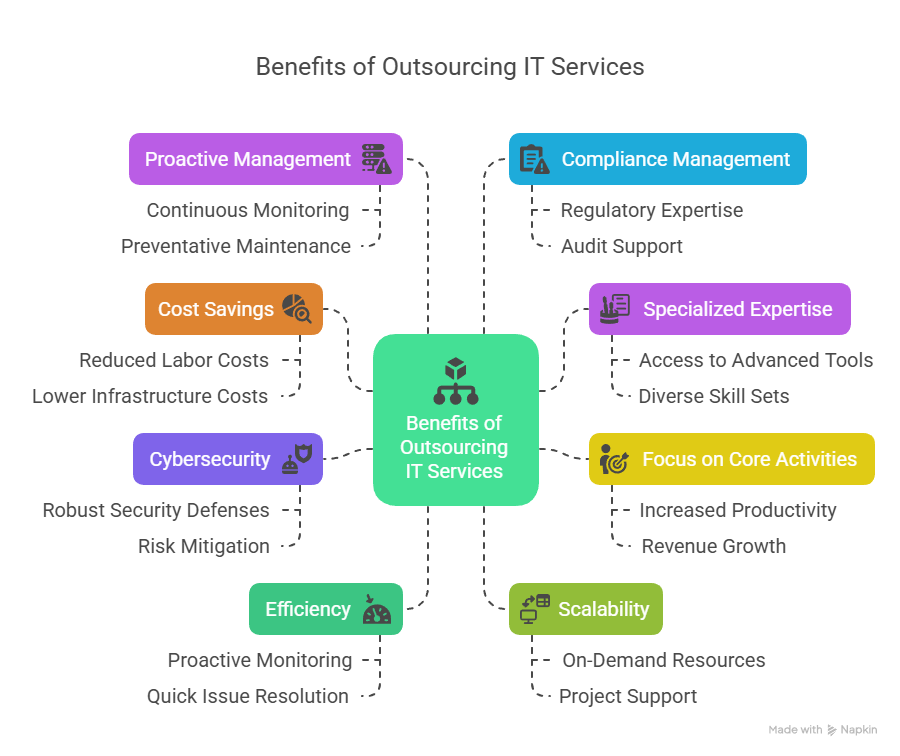
Making the shift to outsourced IT isn’t just about offloading tasks; it’s a strategic decision driven by significant business advantages:
1. Significant Cost Savings & Predictable Budgeting
This is often a primary driver. Outsourcing can lead to substantial savings compared to maintaining an in-house IT team when you factor in:
- Reduced Labor Costs: No need for salaries, benefits, training, and overhead for multiple IT specialists.
- Lower Infrastructure & Tool Costs: MSPs leverage sophisticated monitoring, security, and management tools across multiple clients, making enterprise-grade technology accessible without large upfront investments.
- Predictable Spending: Managed services typically operate on a fixed monthly fee, making IT costs a predictable operational expense (OpEx) instead of unpredictable capital expenditure (CapEx) or emergency repair bills.
This predictability greatly aids budgeting and financial planning.
2. Access to Specialized Expertise & Advanced Tools
Technology is complex and rapidly evolving. It’s challenging for a small internal team to possess deep expertise across all areas – cybersecurity, cloud architecture (Azure, AWS), network engineering, data compliance, specific software platforms, etc. Outsourcing gives you immediate access to a *team* of certified professionals with diverse, up-to-date skills. They also bring advanced tools for monitoring, security (like SIEM or EDR platforms), and management that individual businesses often can’t justify acquiring.
3. Sharpen Your Focus on Core Business Activities
Every hour your non-IT staff spends troubleshooting tech issues or managing IT tasks is an hour *not* spent on developing products, serving customers, generating sales, or strategic planning. Outsourcing IT frees up your valuable internal resources to concentrate on activities that directly drive revenue and growth. Let your team do what they do best, and let the experts handle the tech.
4. Enhanced Cybersecurity & Reduced Risk
Cyber threats are a constant and growing danger. Dedicated IT providers, especially those with strong security practices (or specialized Managed Security Service Providers – MSSPs), implement robust, layered security defenses. This includes proactive monitoring, managing firewalls, deploying advanced endpoint protection, ensuring timely patching, managing backups for ransomware recovery, and often providing crucial security awareness training. Their expertise significantly reduces your risk of costly data breaches, downtime, and reputational damage. Compliance with regulations like GDPR is often better managed by specialists.
5. Increased Efficiency & Reduced Downtime
Proactive management is key here. Outsourced providers (particularly MSPs) use monitoring tools to anticipate and address potential issues *before* they cause system failures. Regular maintenance, patching, and optimization keep systems running efficiently. When issues do occur, specialized teams often resolve them faster than a general internal resource, minimizing disruptive and costly downtime.
6. Scalability and Flexibility On Demand
Business needs fluctuate. Outsourced IT services offer inherent scalability. Need to quickly onboard a new team? Scale up cloud resources? Support a temporary project? An external provider can typically adjust resources and support levels much faster and more cost-effectively than hiring or reassigning internal staff. This flexibility allows your IT to grow seamlessly with your business.
7. Proactive Approach vs. Reactive Scrambles
The break-fix model means waiting for something to fail, then scrambling to fix it (often incurring premium charges and significant downtime). Outsourced Managed Services are built on proactivity – continuous monitoring, preventative maintenance, and strategic planning designed to *prevent* problems in the first place, ensuring greater stability and reliability.
8. Improved Compliance Management
Navigating industry regulations (HIPAA, PCI DSS, FCA rules, etc.) requires specific technical knowledge and documentation. Many IT outsourcing providers have expertise in specific compliance frameworks and can help implement, manage, and audit the necessary controls, reducing your compliance burden and risk.
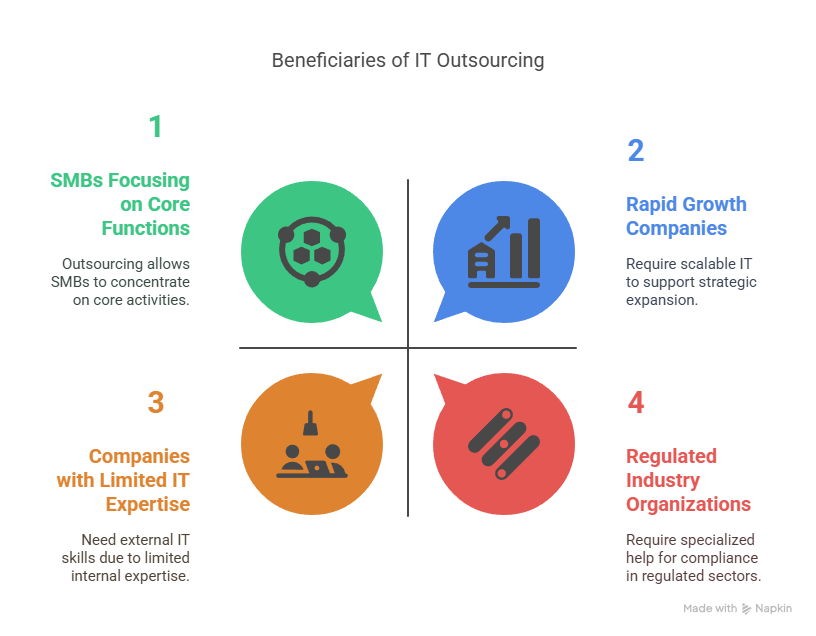
Who Benefits Most from Outsourcing IT?
While businesses of all sizes can benefit, outsourcing is often particularly advantageous for:
- Small and Medium-Sized Businesses (SMBs): Who lack the budget or need for a full, diverse internal IT department.
- Businesses Experiencing Rapid Growth: Requiring scalable IT solutions that can keep pace.
- Companies with Limited Internal IT Expertise: Needing access to specialized skills (especially in cybersecurity or cloud).
- Organizations in Regulated Industries: Requiring expert help with compliance.
- Businesses Seeking to Control or Reduce IT Costs: Looking for predictable expenses and better ROI from technology.
- Companies Wanting to Focus Resources: Aiming to dedicate internal efforts solely to core business functions.
Choosing the Right Outsourcing Partner is Key
Realizing the full benefits of outsourcing IT hinges on selecting the right partner. Key considerations include:
- Their technical expertise and certifications.
- Understanding of your industry and business needs.
- Clear Service Level Agreements (SLAs) defining response times and responsibilities.
- Robust security practices and protocols.
- Transparent pricing and contract terms.
- Scalability of their services.
- Strong client references and reputation.
Addressing Potential Concerns
Some businesses hesitate to outsource due to concerns about control, security, or communication. However, a reputable provider addresses these through clear contracts (SLAs), robust security measures, regular reporting, dedicated account management, and acting as a true partner invested in your success.
Conclusion: A Strategic Move for Growth and Stability
Outsourcing IT is no longer just about cutting costs; it’s a strategic decision that unlocks significant advantages. From gaining access to specialized expertise and enhancing cybersecurity to increasing efficiency, improving scalability, and allowing you to focus on your core mission, the benefits of outsourcing IT are compelling and numerous.
If IT headaches are holding your business back, it’s time to seriously evaluate how partnering with an expert external provider could provide the reliable, secure, and strategic technology foundation you need to thrive in today’s competitive landscape.
